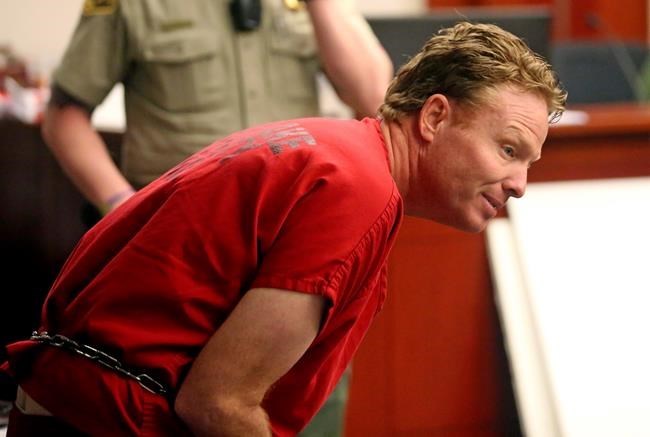
FILE - This Feb. 17, 2017 file photo shows Jeremy Johnson arrives for court during the trial for former Utah Attorney General John Swallow at the Matheson Courthouse, in Salt Lake City. Johnson a onetime helicopter-flying millionaire businessman who played a key role in touching off a high-profile pay-to-pay scandal in Utah is asking a federal appeals court to reverse his conviction for lying to banks to keep his online business afloat. Attorneys for Johnson on Thursday, Sept. 28, 2017, will ask Denver's 10th Circuit Court of Appeals to reverse the man's conviction and sentence on eight counts of making false statements to banks. He was sentenced to more than 11 years in prison. (AP Photo/Rick Bowmer, Pool, File)
September 28, 2017 - 1:22 AM
DENVER - A onetime helicopter-flying millionaire who helped launch a pay-to-play scandal involving two former Utah attorneys general will ask a federal appeals court Thursday to reverse his conviction for lying to banks to keep his online business afloat.
Jeremy Johnson is taking his long-running fraud case to the Denver-based 10th U.S. Circuit Court of Appeals after he was sentenced to more than 11 years in prison last year.
Johnson was once a colorful figure in Utah known as political donor and wealthy businessman who flew his personal helicopter to Haiti for earthquake relief. In 2011, he was arrested at a Phoenix airport carrying more than $26,000 in cash and a one-way plane ticket to Costa Rica.
He later claimed state Attorney General John Swallow arranged to pay then-U.S. Sen. Harry Reid to toss the investigation into Johnson's business after the top lawman took gifts and luxury vacations from Johnson and others.
Reid denied any connection to the allegations and was never charged.
Swallow later resigned amid multiple state and federal influence-peddling investigations that included allegations against his predecessor, Mark Shurtleff.
Shurtleff and Swallow were both charged in wide-ranging pay-to-play cases. Shurtleff's case was later dropped, and Swallow was acquitted. Both men denied any wrongdoing.
Johnson, to bolster his early allegations against Swallow, offered up a secret recording he made of their meeting at a Krispy Kreme doughnut shop. He later refused to testify in Swallow's trial, invoking his Fifth Amendment right not to incriminate himself.
Johnson's fraud conviction capped a five-year buildup that included mountains of evidence, allegations of prosecutorial misconduct, a rejected plea deal and his claims that the government was eavesdropping on his conversations with his lawyers.
Johnson's attorneys argue in his appeal that the banks didn't receive the false statements he is accused of making. They also said Johnson was unconstitutionally denied a right to an attorney because the government seized silver, gold and money he would have used to pay for a lawyer.
Prosecutors said Johnson and his top managers lied to banks to create shell companies because they were in danger of going out of business after being blacklisted by credit card companies.
Johnson, who acted as his own lawyer, said everyone involved knew what he and his colleagues were doing as they tried to deal with a growing number requests for credit card refunds.
His business, I Works, sold online access to government grants and other moneymaking schemes, but after people signed up, the company kept charging their credit cards, prosecutors said.
So many people sought refunds that credit card companies refused to work with I Works. Johnson and other top managers then lied to banks to create new companies in the names of their family and friends, prosecutors said.
Last year, Johnson settled a separate lawsuit brought by the Federal Trade Commission for more than $275 million. Federal regulators said Johnson and others charged consumers' credit cards recurring monthly or one-time fees that were not properly disclosed on websites.
Johnson and Swallow, the former attorney general, also both face a lawsuit from the Federal Elections Commission, alleging that Swallow told Johnson how to skirt campaign contribution limits by illegally funneling donations through family and friends to Sen. Mike Lee of Utah and Shurtleff. Both men have denied the allegations.
News from © The Associated Press, 2017